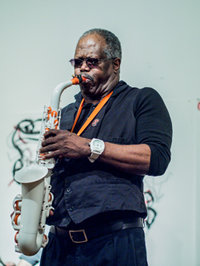Joe McPhee, 75, is a revered figure in the world of free jazz. But just when you have him in your grasp, the ferocious trumpeter, saxophonist and composer from Poughkeepsie bounces away.
“I like a cartoon character called Gerald McBoingBoing,” McPhee said.

“His friends were terrible bullies,” McPhee said. “They made fun of him because he couldn’t speak, but he could make sounds like anything. That’s who I aspire to be.”
It sounds like a joke. McPhee loves to puncture the humorless reputation of avant-garde jazz — but watch out for the punch line.
“Then months passed and Gerald got louder and louder,” goes the verse by Dr. Seuss in the cartoon, “Until one day he went BOOOM like a big keg of powder.”
McPhee’s seminal 1971 album “Nation Time,” recently re-issued to critical acclaim, burned with the fire of the civil rights movement and opposition to the Vietman War, and politics is never far from the surface of McPhee’s music.
“Now there’s the Black Lives Matter movement, we’ve got Trump to deal with and this horror that just happened in Orlando,” McPhee said. “All these things happening in the world are a part of what’s happening with our music and our consciousness.”
Freedom, in life and music, is McPhee’s pole star. He was about 22 when he heard John Coltrane’s classic quartet at the Village Gate.
“It was like when you’re sitting on a jetliner and it goes down the runway,” he said. “Suddenly the engines come on, you feel that thrust in your back and you’re racing into the wind.”
Since the death of free-jazz pioneer Ornette Coleman about a year ago, McPhee and the Universal Indians have folded his music into theirs. McPhee has a personal history with the soft-spoken, oracular saxophonist from Texas.
Shortly after Coltrane’s death, McPhee was in his Manhattan apartment, rehearsing, when Coleman knocked on the door.
“Are you going to the funeral?” he asked McPhee.
McPhee protested that he didn’t have any good clothes.
“You don’t need that. You just go,” Coleman told him.
Hearing Coleman and Albert Ayler play at Coltrane’s funeral, McPhee was moved to play saxophone as well as trumpet.
Under the spell of saxophonists Coltrane, Coleman, Ayler and Eric Dolphy, McPhee gravitated from traditional jazz of Art Blakey, Miles Davis and other 1950s and ‘60s artists to a free, muscular sound that leaves out nothing worth including, from soul and rock music to the theories of unclassifiable American mavericks like Pauline Oliveros and Harry Partch.
A few years ago, McPhee was playing in Amsterdam with another free jazz icon, saxophonist Peter Brötzmann, when he got an email from Amsterdam-based, American saxophonist John Dikeman inviting McPhee to play with his group, Universal Indians, with Norwegian bassist Jon Rune Strøm and drummer Tollef Østvang. (The band got its name from a composition by Ayler and is not to be confused with the hardcore noise-rock band of the same name that got its start in Lansing and played in Detroit in the 1990s.)
“We have never rehearsed and never discuss the music we’re going to play,” McPhee said. “It’s in the moment, in the air.”
The result is an open-air musical fire, sparking at the most fleeting breeze of emotion.
“We listen very intently and that’s how we capture it,” McPhee said. “Free jazz doesn't just mean you play whatever you want and everybody makes a whole bunch of noise. That would be anarchy.”
Universal Indians with Joe McPhee
Kozmic Picnic 2:20 p.m. Saturday, June 11 FREE Broad Art Museum
Support City Pulse - Donate Today!
Comments
No comments on this item Please log in to comment by clicking here